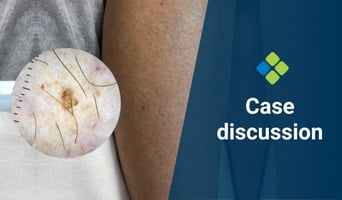In this webinar and Q&A, solicitor and former regulator David Gardner provides exclusive insights...

Learn how to diagnose and treat allergies, provide emergency treatment, manage anaphylaxis, and employ allergen desensitisation therapy in a primary care setting.

General practitioners are often the first place patients will come when experiencing allergic reactions in an attempt to identify and manage those allergies.
This course will equip you with the knowledge to assess and treat different types of allergies — including allergic reactions to food — and provide emergency treatment. You will learn how to manage anaphylaxis, allergic rhinitis, and allergic conjunctivitis, and employ allergen immunotherapy (allergy desensitisation).
- Ideal for practitioners with little to no training in allergy medicine or as a refresher course in anaphylaxis management.
- This CPD-accredited course is for medical doctors, International Medical Graduates, and degree-qualified medical practitioners.
100% online
$495
Special rates available
28.5 hrs
Self-paced
- Allergies affect around 20 per cent of all Australians, and the GP is typically a patient's first port of call when experiencing allergies. Equip yourself with the skills to diagnose and treat these patients in primary care.
- Understand the causes and symptoms of common food allergies to reach a confident diagnosis.
- Provide allergy treatments, including identification and emergency management of anaphylaxis.
- Explore the role of the GP in allergy testing and desensitisation therapy.
Get unlimited access to all course content, additional learning materials, ongoing post-course support, and more.
This module provides a comprehensive understanding of anaphylaxis, a rapidly increasing, potentially life-threatening condition. The curriculum is divided into five key units, covering everything from the historical background to advanced management strategies.
Unit one explores the historical context, definition, and epidemiology of anaphylaxis. It highlights the most frequent causes, including food, medication, and venom from insect stings.
Unit two focuses on the pathophysiology and aetiology of anaphylaxis, examining temporal patterns, cofactors, and risk factors that contribute to its onset.
Unit three discusses the clinical features and timing of reactions, with a detailed guide on diagnosis and differential diagnoses.
Unit four reviews treatment protocols in the community setting, emphasising the critical role of adrenaline, as well as the use of antihistamines, corticosteroids, and appropriate first aid measures. Special populations, including pregnant women and pediatric patients, are also discussed. This unit includes observation guides post-adrenaline administration and a clinical case study.
Unit five covers post-event management, including referrals, investigations, and patient education. It includes information on adrenaline auto-injectors (AAI), action plans, allergen avoidance, and immunotherapy. Two additional case studies provide practical insights into managing this condition effectively.
This module provides a comprehensive understanding of food allergies and anaphylaxis, focusing on key aspects of diagnosis, management, and patient care. In unit one, practitioners are introduced to the differences between allergy and tolerance, epidemiology, and common food allergens such as dairy, eggs, peanuts, tree nuts, sesame, soy, fish, shellfish, and wheat. Unit two delves into the mechanisms underlying food allergies and anaphylaxis, covering the pathophysiology of specific allergens, the causes of allergic reactions, and cross-reactivity between allergens. In unit three, practitioners explore the clinical features of anaphylaxis, including the stages of symptom onset and clinical management, with a focus on diagnostic tools, history-taking, and related conditions such as food protein-induced enterocolitis syndrome (FPIES), lactose intolerance, and eosinophilic esophagitis, illustrated by two clinical case studies. Unit four addresses the management of food allergies, emphasising the importance of specialist and dietitian referrals, nutritional considerations in food elimination, and support for patients with FPIES or egg allergies, as well as a clinical case discussion. Unit five focuses on the management of anaphylaxis, including the use of antihistamines and corticosteroids, acute treatment of non-anaphylactic allergic reactions, and immunomodulation techniques. It also covers practical tools like milk and egg food ladders and offers resources for patient and caregiver support.
This module on allergic rhinitis and allergic conjunctivitis covers the key aspects of these common conditions and emphasises the role of general practitioners (GPs) in patient education and management. The first unit discusses the history, definition, and epidemiology of these conditions, along with their consequences and associated comorbidities. The second unit focuses on the pathophysiology of allergic rhinitis and conjunctivitis, explaining the anatomy and functions of the nose, sinuses, and eyes, and the role of genetics. Unit three provides a classification of allergic rhinitis, including the ARIA guidelines on its impact on asthma. Clinical investigations, and subtypes of allergic conjunctivitis are discussed. Clinical images and red flags are used for enhanced learning. In unit four, allergy testing options, differential diagnoses, and nonallergic rhinitis subtypes are outlined, with two clinical cases discussed for practical insight. The final unit covers general management principles, pharmacotherapy, and treatment options for allergic conjunctivitis, including special considerations for pregnant and breastfeeding patients, allergen immunotherapy, and management of thunderstorm asthma. An additional clinical case is presented.
If you're not interested in pursuing a full certificate in this field but simply want to enhance your skills in specific topics covered in this course, you can access the content of this and other courses for a flat fee of $83 per month (paid annually) within HealthCert 365.


Study at your own pace and to your own schedule.

Easily meet your CPD requirements and gain valuable skills – all in one place for $83 per month.
Bundle two courses and save 5%, or three courses and save 10% upon enrolment.
Talk to us about deferred payment options, registrar scholarships and special rates.

Great course! it is very relevant to all practising GPs. Who knew that there is a pathologist "secret". Every GP should know this!
Dr M. Parashar
Highly satisfied. Real patients and cases enhance the learning experience. I will attend the advanced course.
Dr N. Kazi
Don't miss this course! It's interesting, practical and enjoyable. After attending courses for 30 years, I rank this as number one. The course is very useful to all doctors who diagnose and treat skin lesions. Top marks to the organisers.
Dr P. Laundy
Everything was very relevant and easy to understand. Certainly in a very different league to all the other courses I have attended.
Dr M. Kaur
I wish I had completed this course two years ago. My time in general practice so far has not enhanced my diagnostic or surgical skills and I have been scared about skin checks! I actually feel not only confident but empowered. A fantastic course! Thank you!
Dr A. Mooney
HealthCert courses have become the standard by which you gauge all others.
Dr K. Abolarinwa
Good courses with excellent speakers. I particularly enjoyed the case study scenarios which helped to integrate the knowledge gained.
Dr A. Tucker
This is the pathway to improve your confidence and evolve into the GP you aspire to be.
Dr S. Shinwari
| RACGP Activity Number | ACRRM Activity Number | Activity Title | Education Hours | Performance Hours | Outcome Hours | ||
|---|---|---|---|---|---|---|---|
| 1168340 | 35893 | Anaphylaxis: Causes, symptoms, emergency treatment | 1168340 | 35893 | 3.5 | 6 | 0 |
| 1168718 | 35901 | Food allergies: peanut, tree nut, seeds, seafood, cow’s milk and hen’s eggs | 1168718 | 35901 | 3.5 | 6 | 0 |
| 1169091 | 35904 | Allergic rhinitis, allergic conjunctivitis and desensitisation | 1169091 | 35904 | 3.5 | 6 | 0 |
| Total hours | 10.5 | 18 | 0 | ||||
View the CPD Hours for all HealthCert Education activities.
HealthCert Education provides a variety of Outcome Measurement activities to suit your needs. Please contact an Education Advisor for more information.
The Primary Certificate of Allergy Medicine is for medical doctors and degree-qualified health professionals. The course assumes no prior knowledge or training in the field.
Participants do not have to pass an IELTS test but, as the courses are delivered in English, proficiency in listening, reading and writing English is assumed.
Participants will require access to a computer/laptop, an internet connection and a basic level of technology proficiency to access and navigate the online learning portal.
Upon successful completion of the course requirements, course participants will receive the Primary Certificate of Allergy Medicine, and CPD hours.
This certificate course:
To learn more about the delivery of certificates in Australia and overseas, please visit our FAQs.
This organisation is an RACGP-accredited CPD provider under the RACGP CPD Program.


Don't see your question? Explore other faqs or talk to us.
Fees will vary based on the program and study option selected (fully online vs online + optional practical workshop). Payments can be made upfront or in monthly instalments. Special rates and various payment options are available. GP registrars and doctors in training enjoy a scholarship of up to $500. Talk to us to learn more.
Completion of any HealthCert course or attendance at an event will enable you to access the HealthCert Alumni Program which includes:
HealthCert Education is pleased to issue digital credentials for alumni. Digital credentials are a permanent online record of your successful completion of a HealthCert course and are issued to all course participants in addition to PDF certificates. If you are based in Australia, you also have the option to order a hard copy of your digital certificate for a small additional fee.
The recommended study duration of this certificate course is 28.5 hours, which includes study of the pre-course activities and readings, online lectures, live tutorials, and online assessment. This self-paced course offers the flexibility of 100% online study in your own time, at your own pace, in your own home or office, with no mandatory face-to-face requirements. You are not required to be online at specific times but can view and replay video lectures at your convenience.
All HealthCert courses meet World Federation of Medical Education standards. This certificate course qualifies for CPD hours from the Royal Australian College of General Practitioners (RACGP) and the Australian College of Rural and Remote Medicine (ACRRM) in Australia. It is recognised by the Royal New Zealand College of General Practitioners (RNZCGP) in New Zealand. It is recognised by the Hong Kong College of Family Physicians (HKCFP) in China. It is a self-submitted activity in Dubai and the United Kingdom. It is a self-submitted activity through the College of Family Physicians in Canada. If you live or work outside one of the above-mentioned countries, please contact us on admin@healthcert.com to discuss whether this course can be recognised in your country.

In this webinar and Q&A, solicitor and former regulator David Gardner provides exclusive insights...

This week's case discussion, submitted by Dr Heather Lawson, features a 64-year-old female patient...

Mood changes in the postpartum period are extremely common, ranging from mild and transient “baby...
Want to stay up-to-date with the latest case studies, podcasts, free video tutorials and medical research articles pertinent to primary care?
Our Education Advisors can assist you with any queries and tailor our education pathway to suit your current expertise, interests and career goals.